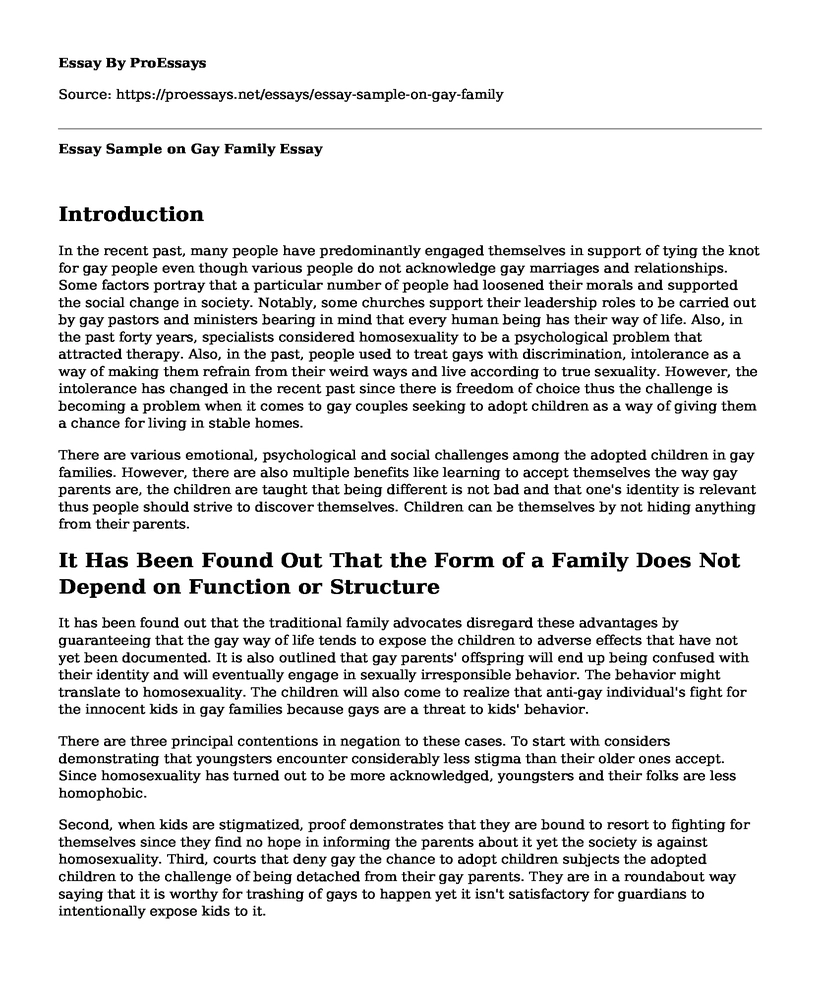Introduction
In the recent past, many people have predominantly engaged themselves in support of tying the knot for gay people even though various people do not acknowledge gay marriages and relationships. Some factors portray that a particular number of people had loosened their morals and supported the social change in society. Notably, some churches support their leadership roles to be carried out by gay pastors and ministers bearing in mind that every human being has their way of life. Also, in the past forty years, specialists considered homosexuality to be a psychological problem that attracted therapy. Also, in the past, people used to treat gays with discrimination, intolerance as a way of making them refrain from their weird ways and live according to true sexuality. However, the intolerance has changed in the recent past since there is freedom of choice thus the challenge is becoming a problem when it comes to gay couples seeking to adopt children as a way of giving them a chance for living in stable homes.
There are various emotional, psychological and social challenges among the adopted children in gay families. However, there are also multiple benefits like learning to accept themselves the way gay parents are, the children are taught that being different is not bad and that one's identity is relevant thus people should strive to discover themselves. Children can be themselves by not hiding anything from their parents.
It Has Been Found Out That the Form of a Family Does Not Depend on Function or Structure
It has been found out that the traditional family advocates disregard these advantages by guaranteeing that the gay way of life tends to expose the children to adverse effects that have not yet been documented. It is also outlined that gay parents' offspring will end up being confused with their identity and will eventually engage in sexually irresponsible behavior. The behavior might translate to homosexuality. The children will also come to realize that anti-gay individual's fight for the innocent kids in gay families because gays are a threat to kids' behavior.
There are three principal contentions in negation to these cases. To start with considers demonstrating that youngsters encounter considerably less stigma than their older ones accept. Since homosexuality has turned out to be more acknowledged, youngsters and their folks are less homophobic.
Second, when kids are stigmatized, proof demonstrates that they are bound to resort to fighting for themselves since they find no hope in informing the parents about it yet the society is against homosexuality. Third, courts that deny gay the chance to adopt children subjects the adopted children to the challenge of being detached from their gay parents. They are in a roundabout way saying that it is worthy for trashing of gays to happen yet it isn't satisfactory for guardians to intentionally expose kids to it.
Conclusion
Individuals who relate to the generalizations and contrary dispositions tend to uphold the fact that most of the gay families will eventually break down and come back to the usual traditional family system. It is therefore right to enforce the fact that gay families are a danger to the present state of affairs and conventional values and appear to be incognizant in regards to the way that the customary family has just been changed.
Cite this page
Essay Sample on Gay Family. (2022, Nov 03). Retrieved from https://proessays.net/essays/essay-sample-on-gay-family
If you are the original author of this essay and no longer wish to have it published on the ProEssays website, please click below to request its removal:
- Ferguson Missouri Events in August 2015
- Cultural Comparison of Bilingualism and Its Effects
- Differences Between Gender, Sex, and Sexuality - Paper Example
- Essay Sample on Family Care of Mental Health
- Essay Sample on Embrace Cultural Diversity: How Classrooms Can Broaden Minds
- Cultural Diversity: Benefits of Inclusion at LaSalle Chemicals Corp - Essay Sample
- Essay Example on Museums: Exploring the Online Offerings of Two Prestigious Institutions







